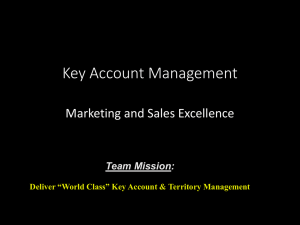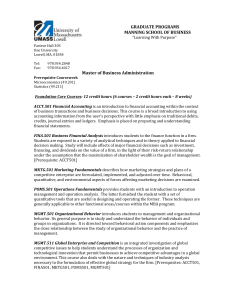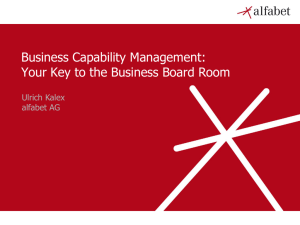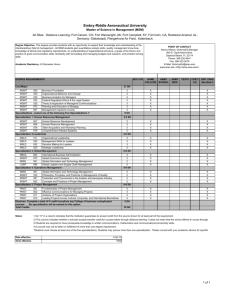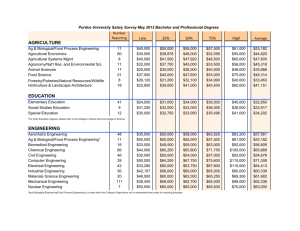PDF of this page - Bulletin
advertisement
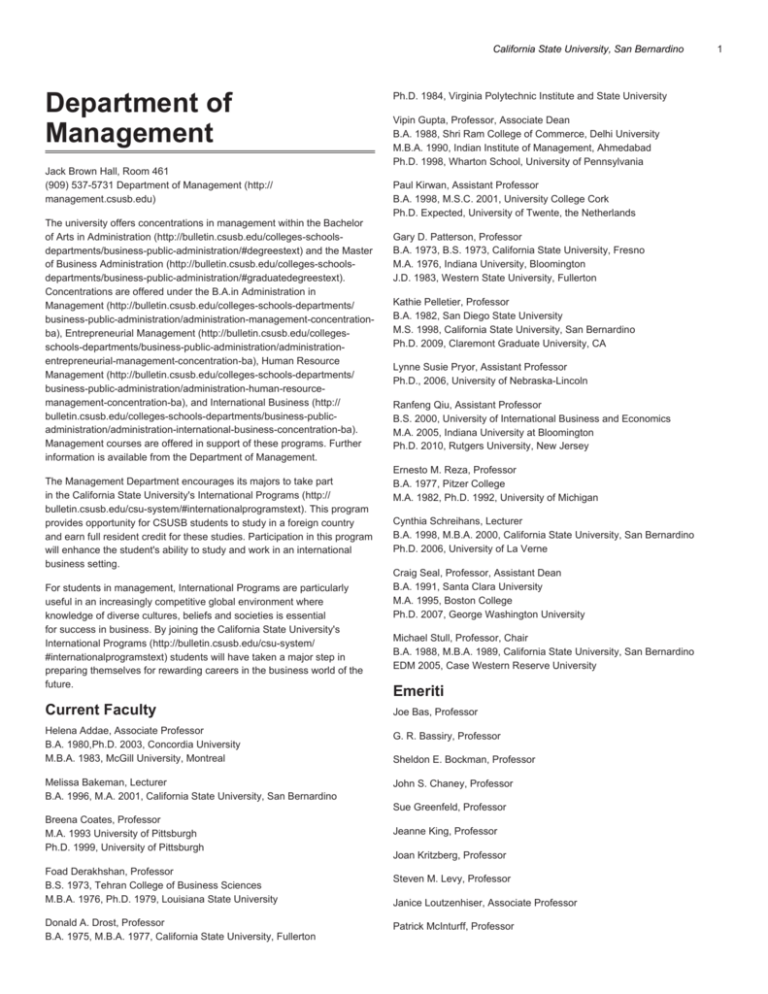
California State University, San Bernardino Department of Management Jack Brown Hall, Room 461 (909) 537-5731 Department of Management (http:// management.csusb.edu) The university offers concentrations in management within the Bachelor of Arts in Administration (http://bulletin.csusb.edu/colleges-schoolsdepartments/business-public-administration/#degreestext) and the Master of Business Administration (http://bulletin.csusb.edu/colleges-schoolsdepartments/business-public-administration/#graduatedegreestext). Concentrations are offered under the B.A.in Administration in Management (http://bulletin.csusb.edu/colleges-schools-departments/ business-public-administration/administration-management-concentrationba), Entrepreneurial Management (http://bulletin.csusb.edu/collegesschools-departments/business-public-administration/administrationentrepreneurial-management-concentration-ba), Human Resource Management (http://bulletin.csusb.edu/colleges-schools-departments/ business-public-administration/administration-human-resourcemanagement-concentration-ba), and International Business (http:// bulletin.csusb.edu/colleges-schools-departments/business-publicadministration/administration-international-business-concentration-ba). Management courses are offered in support of these programs. Further information is available from the Department of Management. The Management Department encourages its majors to take part in the California State University's International Programs (http:// bulletin.csusb.edu/csu-system/#internationalprogramstext). This program provides opportunity for CSUSB students to study in a foreign country and earn full resident credit for these studies. Participation in this program will enhance the student's ability to study and work in an international business setting. For students in management, International Programs are particularly useful in an increasingly competitive global environment where knowledge of diverse cultures, beliefs and societies is essential for success in business. By joining the California State University's International Programs (http://bulletin.csusb.edu/csu-system/ #internationalprogramstext) students will have taken a major step in preparing themselves for rewarding careers in the business world of the future. Ph.D. 1984, Virginia Polytechnic Institute and State University Vipin Gupta, Professor, Associate Dean B.A. 1988, Shri Ram College of Commerce, Delhi University M.B.A. 1990, Indian Institute of Management, Ahmedabad Ph.D. 1998, Wharton School, University of Pennsylvania Paul Kirwan, Assistant Professor B.A. 1998, M.S.C. 2001, University College Cork Ph.D. Expected, University of Twente, the Netherlands Gary D. Patterson, Professor B.A. 1973, B.S. 1973, California State University, Fresno M.A. 1976, Indiana University, Bloomington J.D. 1983, Western State University, Fullerton Kathie Pelletier, Professor B.A. 1982, San Diego State University M.S. 1998, California State University, San Bernardino Ph.D. 2009, Claremont Graduate University, CA Lynne Susie Pryor, Assistant Professor Ph.D., 2006, University of Nebraska-Lincoln Ranfeng Qiu, Assistant Professor B.S. 2000, University of International Business and Economics M.A. 2005, Indiana University at Bloomington Ph.D. 2010, Rutgers University, New Jersey Ernesto M. Reza, Professor B.A. 1977, Pitzer College M.A. 1982, Ph.D. 1992, University of Michigan Cynthia Schreihans, Lecturer B.A. 1998, M.B.A. 2000, California State University, San Bernardino Ph.D. 2006, University of La Verne Craig Seal, Professor, Assistant Dean B.A. 1991, Santa Clara University M.A. 1995, Boston College Ph.D. 2007, George Washington University Michael Stull, Professor, Chair B.A. 1988, M.B.A. 1989, California State University, San Bernardino EDM 2005, Case Western Reserve University Emeriti Current Faculty Joe Bas, Professor Helena Addae, Associate Professor B.A. 1980,Ph.D. 2003, Concordia University M.B.A. 1983, McGill University, Montreal G. R. Bassiry, Professor Melissa Bakeman, Lecturer B.A. 1996, M.A. 2001, California State University, San Bernardino John S. Chaney, Professor Sheldon E. Bockman, Professor Sue Greenfeld, Professor Breena Coates, Professor M.A. 1993 University of Pittsburgh Ph.D. 1999, University of Pittsburgh Foad Derakhshan, Professor B.S. 1973, Tehran College of Business Sciences M.B.A. 1976, Ph.D. 1979, Louisiana State University Donald A. Drost, Professor B.A. 1975, M.B.A. 1977, California State University, Fullerton Jeanne King, Professor Joan Kritzberg, Professor Steven M. Levy, Professor Janice Loutzenhiser, Associate Professor Patrick McInturff, Professor 1 2 Department of Management Clark Molstad, Professor Lloyd E. Peake, Professor James Rogers, Professor Elisabeth Ryland, Professor Christine Schalow, Professor Courses MGMT 100. Introduction to Business and Public Administration. 4 Units. Introduction to the administrative process. Strategies to achieve success in business and public careers. Includes the development of administrative theories and practices and provides an overview of the functional areas of business and public administration. Examines the questions of ethics, small business management and the global aspects of administration. MGMT 230. Business Law. 4 Units. An introduction to statutory and common law developments impacting commercial transactions. Emphasizes principles of contract law and sale of goods under the Uniform Commercial Code. Additional topics include business organizations, commercial paper and secured transactions. MGMT 302. Management and Organizational Behavior. 4 Units. MGMT 335. Business, Ethics, and Society. 4 Units. Prerequisites: the upper-division writing requirement Social and legal factors influencing business; social expectations for ethical conduct and corporate social responsibility (CSR); role of business in alleviating societies problems; problems and issues of current concern regarding women and minorities in management; business and society in a global context. MGMT 350. Administrative Communications. 4 Units. Prerequisites: the upper-division writing requirement Introduction to communication theory. Concepts, analysis and methods of improvement for interpersonal communication, communication within organizations and communication between organizations and their external environments. MGMT 402. Studies in Organizational Behavior. 4 Units. Prerequisites: MGMT 302 or PSYC 302 Review and presentation of selected areas of behavioral science research and its application to management practices. Selected subjects may include: motivation, communication, change and leadership. MGMT 405. Managing Across Borders. 4 Units. Introduction to management as it affects operations and the behavior of people in relation to the functional fields of administration. Selected behavioral concepts analyzed with respect to applications in management. Offered as MGMT 302 and PSYC 302. Students may not receive credit for both. Prerequisites: MGMT 302 or PSYC 302 Identification of the diverse factors and actors that shape the global business environment. Comparative analysis of management practices in various cultures with emphasis on sociocultural, political and economic influences. Balancing of local responsiveness and global integration, and decision-making skills for managing across borders are emphasized. MGMT 306. Expository Writing for Administration. 4 Units. MGMT 406. International Business Law. 4 Units. Prerequisites: satisfaction of the GE written communication (A1) requirement and a minimum of 90 quarter (60 semester) units of college credit (GE=F1) Writing related to business and public administration including documented research reports, summaries and analytical papers. Revision and rewriting will be required. Course fulfills the graduation requirement in writing proficiency. May not be counted for fulfilling concentration requirements for any degree program offered by the College of Business and Public Administration. No more than one of the expository writing courses (EDUC 306, ENG 306, HUM 306, MGMT 306, NSCI 306, SSCI 306) may be taken for credit. Students who have received a grade of no credit in any combination of the expository writing courses two or more times must meet with the 306 coordinator or designee to design a developmental writing plan as a condition for enrolling for a third quarter. All students must obtain junior status at the time of registration or their course request will be cancelled. Formerly MGMT 495. Graded A, B, C/no credit. Comparison and contrast of the various dimensions of international business transactions. General legal framework in which international business is conducted; competing national laws and courts systems with respect to a variety of typical international business problems; international institutions and prospects for internationalizing the legal treatment of transnational business operations. MGMT 330. Legal Environment of Business. 4 Units. Prerequisites: MGMT 230 Study of the legal system; nature and source of law as applied to business activity; statutes and significant cases involving business policies; effect of public policies on private enterprise system. MGMT 407. Comparative Management Systems of the Americas. 4 Units. Comparative analysis of private and public sector organizations and corresponding management systems currently operating throughout the Americas. Examination of the structure and management systems of private and public sector organizations in different American countries and the trade patterns among these nations. MGMT 408. Managing in Europe. 4 Units. Identification of the diverse factors and actors that shape the business environment in one or more nations in Europe. Comparative analysis of management practices and leadership challenges and approaches for navigating sociocultural, political and eocnomic contexts. MGMT 442. Small Business Management. 4 Units. Managerial considerations for the small business entrepreneur. Acquisitions, location, legal considerations, finances, taxation, labor relations and other topics. California State University, San Bernardino 3 MGMT 451. Organization and Management Theory. 4 Units. MGMT 470. Strategic Human Resource Management. 4 Units. Prerequisites: MGMT 302 or PSYC 302 Development and analysis of organization and management theory. Comparative analysis seeking patterns and systematic explanation of differences among organizations. Dynamics of interaction between organizations and environment. Prerequisites: MGMT 455; MGMT 456 or PSYC 355; and MGMT 458 Capstone course integrating human resource management materials acquired through the required concentration courses and addressing the strategic role of HR professionals in organizations. MGMT 452. Leading Effectively and Ethically. 4 Units. Prerequisites: completion of the upper-division administration core courses (one course may be taken concurrently), the upper-division writing requirement, and senior standing This college capstone course develops an overall general manager's perspective of strategic management and competitive strategy integrating knowledge from accounting, finance, information and decision sciences, management, marketing, public policy, and supply chain management. Coverage includes competitive strategy for global, national and regional/local business and managerial concerns regarding social and environmental issues. Prerequisites: MGMT 302 or PSYC 302 Relevant theories and concepts for leading individuals and groups effectively and for developing ethical awareness to respond appropriately to ethical dilemmas. MGMT 455. Human Resources Management. 4 Units. Prerequisites: MGMT 302 or PSYC 302, and the upper-division writing requirement Policies related to human resources; human resources planning, employee selection and development, performance appraisal, compensation, relationships with unionized employees, collective bargaining. MGMT 456. Developing an Effective Workforce. 4 Units. Prerequisites: MGMT 455 or PSYC 355 Theory and practice of employee selection, training, and performance appraisal. MGMT 457. Industrial and Labor Relations. 4 Units. Analysis of historical, political, legal, economic and managerial forces which lead to the development of labor unions and collective bargaining. Focus on legal rights of employees and managerial rights of employer. Involves case law and bargaining simulation. MGMT 458. Fair Employment Practices. 4 Units. Prerequisites: MGMT 455 An evaluation of fair employment practices in employment. Course emphasizes antidiscriminatory legislation and its application to employeremployee relationships. MGMT 459. Work Group Management. 4 Units. Prerequisites: MGMT 302 or PSYC 302 Examination of the dynamics of task-oriented groups in American and international environments, utilizing both conceptual and experiential learning. MGMT 460. Compensation and Performance. 4 Units. An examination of reward systems, both financial and non-financial, in the business enterprise. Financial rewards include the process of job analysis, job evaluation, and the market surveys with an emphasis on the firm's competitive strategy. Benefit administration and compensation systems for special groups are also presented. Various systems of performance management are studied, including individual employee performance appraisals. MGMT 490. Strategic Management. 4 Units. MGMT 515. Business Consulting. 4 Units. Prerequisites: senior status, consent of instructor and college Supervised consulting assignments designed to provide meaningful business assistance to businesses. MGMT 520. Legal Regualtion of Intellectual Property. 4 Units. Prerequisites: MGMT 230 and 330 Analysis of federal, state and international law on intellectual property and technology, including principles of contract law, intellectual law, taxation law, tort law, anti-trust law and criminal law with respect to technology and intellectual property. MGMT 526. Global Entrepreneurship. 5 Units. Entrepreneurial process in a global context as it relates to recognizing ideas, marshaling resources, developing networks and creating the strategy for a new cross-border venture. MGMT 541. Commercializing Entrepreneurial Innovation. 4 Units. Examines the process of commercializing innovations and emerging technologies in entrepreneurial driven companies. Focus on understanding the strategy, tactics and behaviors necessary to manage the transition from basic development stages to commercial venture, examining the role of innovation assessment, intellectual property protection, technology transfer and licensing. MGMT 543. New Venture Opportunity Analysis. 4 Units. Process of defining and identifying the difference between ideas and opportunities including the role of the entrepreneur, ideas, pattern recognition, and the evaluation and screening process that leads to successful commercialization of business concepts and ideas. MGMT 544. New Venture Development. 4 Units. Introduction to the process of developing a new venture concept. Examines key issues in new venture creation, including the role of the entrepreneur in transitioning ideas to business opportunities. Special emphasis on developing a rapid opportunity analysis, identifying a sustainable business model, and business planning. 4 Department of Management MGMT 545. New Venture Resource Requirements. 4 Units. Strategies and techniques employed by entrepreneurs to identify and access critical resources. Special emphasis on marshalling internal and external resources such as advisors, board of directors, and social networks. MGMT 547. Managing a Growing Business. 4 Units. Study of the basic strategy and tactics to manage growing enterprises while still maintaining an entrepreneurial spirit. Examines the role of management decision making, management control systems, shortand long-term planning, and entrepreneurship in managing growing companies. MGMT 549. Launching the Entrepreneurial Venture. 4 Units. Prerequisites: MGMT 543 and MGMT 544 Process and methods involved in starting and growing new enterprises with emphasis on the attributes of entrepreneurs, entrepreneurial careers and positioning an enterprise for sustainable growth. MGMT 575. Internship. 4 Units. Prerequisites: senior standing preferred; consent of instructor and the departments internship coordinator Supervised work and study in private or public organizations. May be repeated once for credit. A total of two College of Business and Public Administration 575 courses may be applied toward graduation. Graded credit/no credit. MGMT 595D. Independent Study. 4 Units. Prerequisites: a minimum overall grade point average of 3.0, consent of instructor and approval by the department of a written project/proposal submitted to the appropriate department in the College of Business and Public Administration on a standard application filed in advance of the quarter in which the course is to be taken Special topics involving library and/or field research. A total of 10 units in any College of Business and Public Administration 595 may be applied toward graduation. Marketing (1-5 units). MGMT 601. Organization Theory and Behavior. 4 Units. A critical analysis of theories for viewing organizations and an examination of the common models for understanding human behavior, including executive behavior, within the constraints of a complex social system. MGMT 620. Business Law for Entrepreneurs. 4 Units. Critical analysis of the impact of administrative law and policy on entrepreneurial decision-making and strategy. Integrates legal, political, regulatory and ethical issues encountered by entrepreneurs. MGMT 621. Entrepreneurship and New Ventures. 4 Units. MGMT 590B. Seminar in Management. 2 Units. Prerequisites: completion of, or concurrent enrollment in, MGMT 601 Study of the entrepreneurial process from a behavioral perspective. Review of theoretical and empirical literature as a foundation for analyzing case studies of successful entrepreneurs. Focus on managerial challenges for new and growing companies with special emphasis on the entrepreneurial personality, leadership, ethics, motivation, goal setting, group dynamics, and organizational design. Intensive study of some phase of management to be developed by the instructor. May be repeated for credit as topics change. MGMT 623. Piloting the New Venture. 4 Units. MGMT 590C. Seminar in Management. 3 Units. Study of the exploration process for new venture concepts. Focus on examining the tools and processes involved in developing a new venture, including formulation of a sustainable business model, preforming a comprehensive feasibility analysis, and concept testing. Intensive study of some phase of management to be developed by the instructor. May be repeated for credit as topics change. MGMT 590D. Seminar in Management. 4 Units. Intensive study of some phase of management to be developed by the instructor. May be repeated for credit as topics change. MGMT 595B. Independent Study. 2 Units. Prerequisites: a minimum overall grade point average of 3.0, consent of instructor and approval by the department of a written project/proposal submitted to the appropriate department in the College of Business and Public Administration on a standard application filed in advance of the quarter in which the course is to be taken Special topics involving library and/or field research. A total of 10 units in any College of Business and Public Administration 595 may be applied toward graduation. Marketing (1-5 units). MGMT 625. New Venture Planning and Strategy. 4 Units. Prerequisites: MGMT 621 and MGMT 623 Study of the policies, strategies, and planning processes involved in entrepreneurship. Integrates important technical and innovative considerations with traditional managerial theories to establish a modern approach to the development of business plans, strategies and policies for new ventures. MGMT 626. International New Venture Development. 4 Units. Entrepreneurial process in a global context examining the complexity of international entrepreneurship as it relates to recognizing ideas, marshaling resources, developing networks and creating the strategy for a new venture. MGMT 641. Managing Human Resources. 4 Units. Analysis of specific areas and problems in the administration of human resource systems and policies. Topics include employment law, job analysis, recruitment, selection, performance appraisal, and compensation administration. California State University, San Bernardino MGMT 642. Communication and Interpersonal Processes. 4 Units. Study of interpersonal processes, communication, and conflict as they relate to organizational efficiency and effectiveness, as well as a consideration of the organization as a communication system. MGMT 644. Industrial Relations. 4 Units. Analysis of industrial relations systems in major industries, collective bargaining institutions, processes, legal environment and problems. MGMT 645. Negotiation and Bargaining. 4 Units. MGMT 695. Graduate Project. 4 Units. Prerequisites: advancement to candidacy, written approval of the student's graduate project committee and approval of the graduate (MBA) director Independent graduate research for the management concentration or the concentration in entrepreneurship. Project will be under the direction of a faculty member. MGMT 698A. Continuous Enrollment for Graduate Candidacy Standing. 1 Unit. Prerequisites: MGMT 601 or consent of instructor Management and leadership of organizations in global environments. Emphasis on economic, political and sociocultural influences. Prerequisites: advancement to candidacy and approval of program graduate coordinator or, if an interdisciplinary studies major, consent of the Dean of Graduate Studies Independent study leading to completion of requirements (other than course work) for the master's degree. To retain classified standing in the master's program, a student must enroll in 698 each quarter until the project or thesis is accepted or the comprehensive examination passed. Students who enroll in 698 through the university have full use of all university facilities. See Culminating Experience: Exam, Thesis, or Project in Graduate Degree and Program Requirements section of the Bulletin of Courses. 698 is a variable unit course, see fee schedule in the Financial Information section of the Bulletin of Courses. Earned units are not degree-applicable nor will they qualify for financial aid. MGMT 655. Leadership for Modern Organizations. 4 Units. MGMT 698B. Continuous Enrollment for Graduate Candidacy Standing. 2 Units. An overview of leadership emphasizing an understanding and analysis of the research on classical and contemporary theories in the field of organizational leadership. Prerequisites: advancement to candidacy and approval of program graduate coordinator or, if an interdisciplinary studies major, consent of the Dean of Graduate Studies Independent study leading to completion of requirements (other than course work) for the master's degree. To retain classified standing in the master's program, a student must enroll in 698 each quarter until the project or thesis is accepted or the comprehensive examination passed. Students who enroll in 698 through the university have full use of all university facilities. See Culminating Experience: Exam, Thesis, or Project in Graduate Degree and Program Requirements section of the Bulletin of Courses. 698 is a variable unit course, see fee schedule in the Financial Information section of the Bulletin of Courses. Earned units are not degree-applicable nor will they qualify for financial aid. Theory and practice of negotiation and bargaining including the analytical skills necessary to prepare, plan, and present advocacy positions, anticipate opposing positions, envision and achieve optimal resolutions of disputes. Course participants will simulate, negotiate, debrief, discuss, and evaluate negotiation problems, strategies and tactics. MGMT 650. Managing and Leading Global Business. 4 Units. MGMT 660. Managing Teams in the Workplace. 4 Units. Overview to understand the dynamics present and best practices to manage high performance work teams. Topics include methods for self awareness, interviewing, stress management, supportive communication, problem solving, influencing and motivating others, managing conflict, empowering, delegating, and team building. Formerly a topic under MGMT 690. MGMT 675. Internship. 4 Units. Prerequisites: consent of instructor and department's internship coordinator Supervised work and study in private or public organizations. May be repeated once for credit. A total of two College of Business and Public Administration 675 courses may be applied toward graduation. Graded credit/no credit. MGMT 685. Corporate Strategy in a Global Economy. 4 Units. Long-term strategy of the business organization in the context of the global economy from the perspective of the General Manager who has overall responsibility for the performance of the firm or the business unit of the firm. Topics include strategy formulation and implementation, industry competitive analysis, core competencies and key success factors, diversification and strategic alliances, all within a global framework. Emphasis is on cases and small-group work. MGMT 690. Advanced Topics in Management. 4 Units. Intensive study of an advanced topic in management. May be repeated for credit as topics change. 5 MGMT 698C. Continuous Enrollment for Graduate Candidacy Standing. 3 Units. Prerequisites: advancement to candidacy and approval of program graduate coordinator or, if an interdisciplinary studies major, consent of the Dean of Graduate Studies Independent study leading to completion of requirements (other than course work) for the master's degree. To retain classified standing in the master's program, a student must enroll in 698 each quarter until the project or thesis is accepted or the comprehensive examination passed. Students who enroll in 698 through the university have full use of all university facilities. See Culminating Experience: Exam, Thesis, or Project in Graduate Degree and Program Requirements section of the Bulletin of Courses. 698 is a variable unit course, see fee schedule in the Financial Information section of the Bulletin of Courses. Earned units are not degree-applicable nor will they qualify for financial aid. 6 Department of Management MGMT 698D. Continuous Enrollment for Graduate Candidacy Standing. 4 Units. MGMT 698Z. Continuous Enrollment for Graduate Candidacy Standing. 0 Units. Prerequisites: advancement to candidacy and approval of program graduate coordinator or, if an interdisciplinary studies major, consent of the Dean of Graduate Studies Independent study leading to completion of requirements (other than course work) for the master's degree. To retain classified standing in the master's program, a student must enroll in 698 each quarter until the project or thesis is accepted or the comprehensive examination passed. Students who enroll in 698 through the university have full use of all university facilities. See Culminating Experience: Exam, Thesis, or Project in Graduate Degree and Program Requirements section of the Bulletin of Courses. 698 is a variable unit course, see fee schedule in the Financial Information section of the Bulletin of Courses. Earned units are not degree-applicable nor will they qualify for financial aid. Prerequisites: advancement to candidacy and approval of program graduate coordinator or, if an interdisciplinary studies major, consent of the Dean of Graduate Studies Independent study leading to completion of requirements (other than course work) for the master's degree. To retain classified standing in the master's program, a student must enroll in 698 each quarter until the project or thesis is accepted or the comprehensive examination passed. Students who enroll in 698 through the university have full use of all university facilities. See Culminating Experience: Exam, Thesis, or Project in Graduate Degree and Program Requirements section of the Bulletin of Courses. 698 is a variable unit course, see fee schedule in the Financial Information section of the Bulletin of Courses. Earned units are not degree-applicable nor will they qualify for financial aid. MGMT 698E. Continuous Enrollment for Graduate Candidacy Standing. 5 Units. MGMT 998. Baccalaureate Reflective Essay. 0 Units. Prerequisites: advancement to candidacy and approval of program graduate coordinator or, if an interdisciplinary studies major, consent of the Dean of Graduate Studies Independent study leading to completion of requirements (other than course work) for the master's degree. To retain classified standing in the master's program, a student must enroll in 698 each quarter until the project or thesis is accepted or the comprehensive examination passed. Students who enroll in 698 through the university have full use of all university facilities. See Culminating Experience: Exam, Thesis, or Project in Graduate Degree and Program Requirements section of the Bulletin of Courses. 698 is a variable unit course, see fee schedule in the Financial Information section of the Bulletin of Courses. Earned units are not degree-applicable nor will they qualify for financial aid. Prerequisites: completion of or concurrent enrollment in all courses in student's area of concentration Submission of a reflective essay based on departmental guidelines. MGMT 698F. Continuous Enrollment for Graduate Candidacy Standing. 6 Units. Prerequisites: advancement to candidacy and approval of program graduate coordinator or, if an interdisciplinary studies major, consent of the Dean of Graduate Studies Independent study leading to completion of requirements (other than course work) for the master's degree. To retain classified standing in the master's program, a student must enroll in 698 each quarter until the project or thesis is accepted or the comprehensive examination passed. Students who enroll in 698 through the university have full use of all university facilities. See Culminating Experience: Exam, Thesis, or Project in Graduate Degree and Program Requirements section of the Bulletin of Courses. 698 is a variable unit course, see fee schedule in the Financial Information section of the Bulletin of Courses. Earned units are not degree-applicable nor will they qualify for financial aid.
